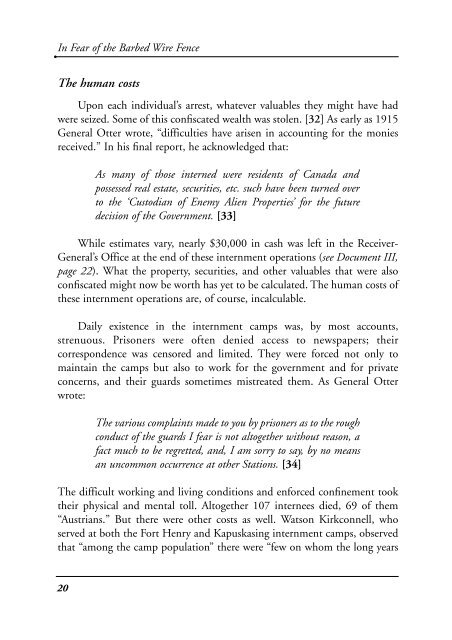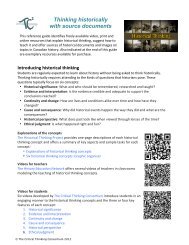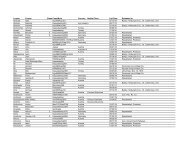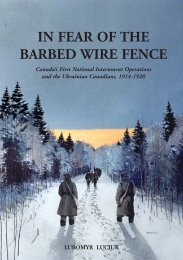In Fear of the Barbed Wire Fence - Ukrainian Canadian Civil ...
In Fear of the Barbed Wire Fence - Ukrainian Canadian Civil ...
In Fear of the Barbed Wire Fence - Ukrainian Canadian Civil ...
You also want an ePaper? Increase the reach of your titles
YUMPU automatically turns print PDFs into web optimized ePapers that Google loves.
<strong>In</strong> <strong>Fear</strong> <strong>of</strong> <strong>the</strong> <strong>Barbed</strong> <strong>Wire</strong> <strong>Fence</strong><br />
The human costs<br />
Upon each individual’s arrest, whatever valuables <strong>the</strong>y might have had<br />
were seized. Some <strong>of</strong> this confiscated wealth was stolen. [32] As early as 1915<br />
General Otter wrote, “difficulties have arisen in accounting for <strong>the</strong> monies<br />
received.” <strong>In</strong> his final report, he acknowledged that:<br />
As many <strong>of</strong> those interned were residents <strong>of</strong> Canada and<br />
possessed real estate, securities, etc. such have been turned over<br />
to <strong>the</strong> ‘Custodian <strong>of</strong> Enemy Alien Properties’ for <strong>the</strong> future<br />
decision <strong>of</strong> <strong>the</strong> Government. [33]<br />
While estimates vary, nearly $30,000 in cash was left in <strong>the</strong> Receiver-<br />
General’s Office at <strong>the</strong> end <strong>of</strong> <strong>the</strong>se internment operations (see Document III,<br />
page 22). What <strong>the</strong> property, securities, and o<strong>the</strong>r valuables that were also<br />
confiscated might now be worth has yet to be calculated. The human costs <strong>of</strong><br />
<strong>the</strong>se internment operations are, <strong>of</strong> course, incalculable.<br />
Daily existence in <strong>the</strong> internment camps was, by most accounts,<br />
strenuous. Prisoners were <strong>of</strong>ten denied access to newspapers; <strong>the</strong>ir<br />
correspondence was censored and limited. They were forced not only to<br />
maintain <strong>the</strong> camps but also to work for <strong>the</strong> government and for private<br />
concerns, and <strong>the</strong>ir guards sometimes mistreated <strong>the</strong>m. As General Otter<br />
wrote:<br />
The various complaints made to you by prisoners as to <strong>the</strong> rough<br />
conduct <strong>of</strong> <strong>the</strong> guards I fear is not altoge<strong>the</strong>r without reason, a<br />
fact much to be regretted, and, I am sorry to say, by no means<br />
an uncommon occurrence at o<strong>the</strong>r Stations. [34]<br />
The difficult working and living conditions and enforced confinement took<br />
<strong>the</strong>ir physical and mental toll. Altoge<strong>the</strong>r 107 internees died, 69 <strong>of</strong> <strong>the</strong>m<br />
“Austrians.” But <strong>the</strong>re were o<strong>the</strong>r costs as well. Watson Kirkconnell, who<br />
served at both <strong>the</strong> Fort Henry and Kapuskasing internment camps, observed<br />
that “among <strong>the</strong> camp population” <strong>the</strong>re were “few on whom <strong>the</strong> long years<br />
20







